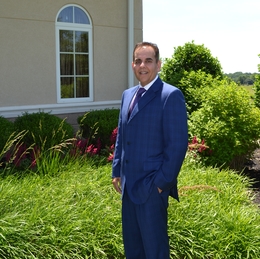
According to Dr. Vic Bahal of Advanced Cardiology of South Jersey, your chest pain could be killing you. That pain could very well be a symptom of cardiovascular disease, which accounts for nearly 836,546 deaths per year in the United States, according to the American Heart Association.
Yet, despite medicine’s advanced technology, efforts to reduce mortality from heart disease have not been successful. “Early signs have not been recognized by the patient because the awareness is not there in the public community as much as it should be,” explains Dr. Bahal.
To help educate patients on the early signs of heart disease—especially those at risk, which accounts for both men and women beyond the age of 50, individuals with family history, obesity, high blood pressure, hypertension, hyperlipidemia, diabetes or obstructive sleep apnea—Dr. Bahal is leading the pack. Coupled with his practice’s cutting-edge technology and mission of helping patients take control of their heart health, heart disease may have met its match.
First, it’s crucial to note what spurs on hea rt disease symptoms. As Dr. Bahal explains, inflammation, which is caused by stress, is also known to play a big role in heart disease. Issues including hypertension and high blood pressure can damage th e inner lining of the arteries causing plaque, leading to blockages. “When blockages are tight enough or severe enough, a patient has chest discomfort and that could lead to death if heart attack occurs,” explains Dr. Bahal.
When those blockages occur—otherwise known as coronary disease—symptoms include chest discomfort, shortness of breat h, heart palpitations , arm and jaw pain, or even no pain. “Someone who has exertional chest pain or chest discomfort, it could even be tightness, burning or pressure. Sometimes it occurs even without exertion; it could occur at rest,” says Dr. Bahal.
“Any chest discomf ort that occurs with activity or rest, coupled with some of the above mentioned risk factors, should push someone to see a cardiologi st early. … Even jaw pain at times is a sign of heart disease. In women, a lot of times, heart disease or heart attacks are silent, me aning they present with no symptoms. “Chest pain could be serious [and] it should not be taken lightly,” adds Dr. Bahal. “A lot of tim es chest pain is a great masquerader with people who have indigestion. If you have indigestion and risk factors for heart disease, you ha ve to get checked out.”
Armed with knowing the early signs of heart disease, Dr. Bahal is quick to offer helpful prevention tactics in orde r to help patients prevent a possible heart attack. “If [someone has] hypertension, [they need to] optimize blood pressure and blo od sugar control. Optimize weight, body mass index—ideally within the 23-25 range—for [both] men and women, diet and exercise,” he adds. “I would say exercise [at least] five times a week; the American Heart Association recommends that. Basically just eat good, [clean] fo od. … Avoid artificial flavors and colors because all of those cause inflammation.”
For individuals who have symptoms of heart disease, Dr. Bahal suggests seeing a cardiologist and have a stress test completed. “A stress test is a very effective [and] cost-effective tool to identify any significant blockages in your coronary arteries,” he explains. “Also, a lot of times we do an echocardiogram. … I woul d recommend an echocardiogram [because] that would allow me to determine the structure and function of the heart. That’s something whic h is not borne out by doing a stress test. A stress test tells me the ‘plumbing.’ … Echo tells us other things like the [status of the] valves of the heart.”
What’s more, Advanced Cardiology of South Jersey also provides a high-end prevention test known as Endothelial Funct ion Testing, which Dr. Bahal explains, is the only office in South Jersey that offers it. “Endothelial dysfunction means the inner lining of the artery is bad and once that inner lining of the artery goes bad, plaque starts. This test takes 15 minutes. Probes are placed on each index finger on th e right and left hand and that will tell us if [a patient has] endothelial dysfunction or not,” he says. “If they do have it, we would implement strategies to reverse endothelial dysfunction such as nitric oxide support, CoQ10 and fish oils, to name a few.”
To make an appointment to see Dr. Bahal, please call (856) 241-3838.
Advanced Cardiology of South Jersey
4 Burton Lane, Suite 100
Mullica Hill | (856) 241-3838
AdvancedCardiologySJ.com
Photography by Alison Dunlap
Published (and copyrighted) in Suburban Family Magazine, Volume 9, Issue 4 (June 2018).
For more info on Suburban Family Magazine, click here.
For information about advertising in Suburban Family Magazine, click here.
To find out where to pick up your copy of Suburban Family Magazine, click here.




